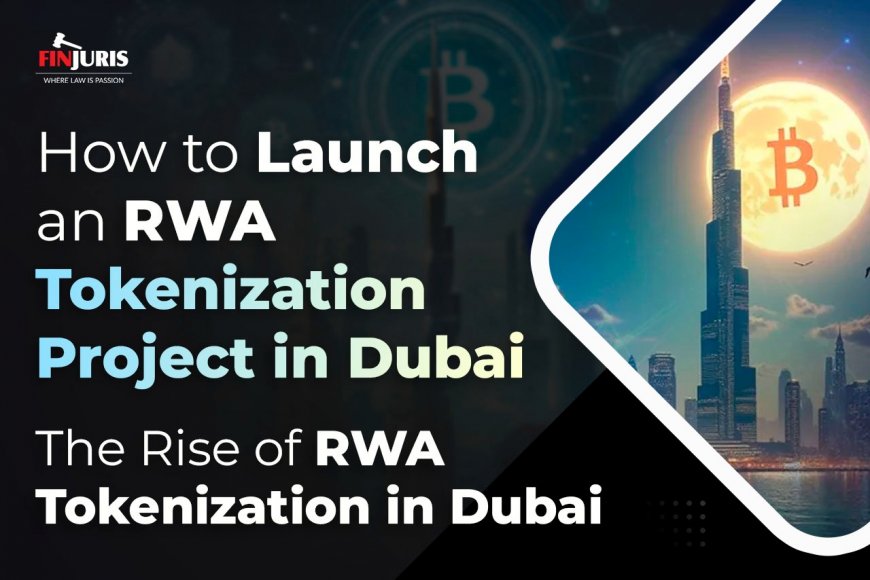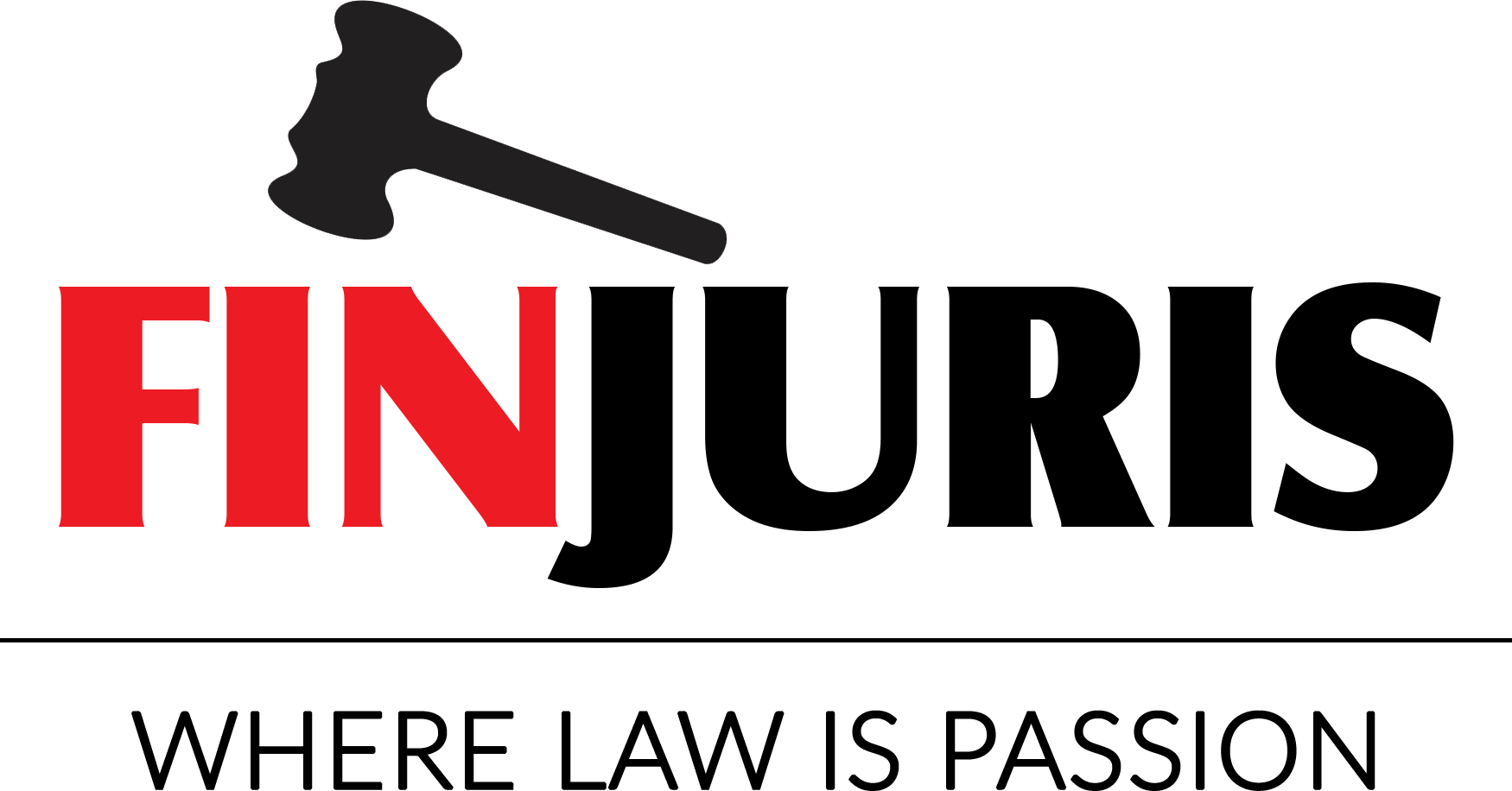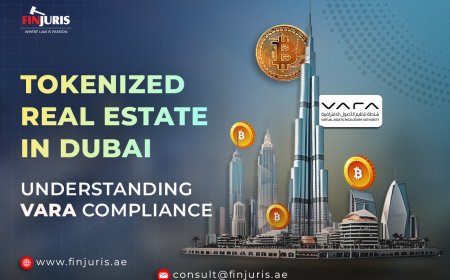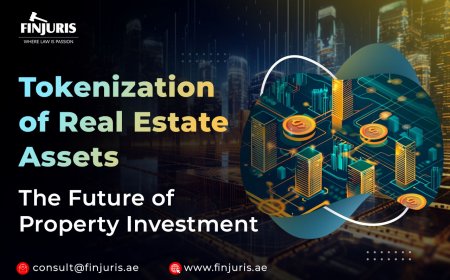How to Launch an RWA Tokenization Project in Dubai (2025 Edition): The Rise of RWA Tokenization in Dubai
Learn how to launch an RWA tokenization project in Dubai in 2025, exploring legal, technical, and market opportunities in the UAE.

In the past decade, Dubai has moved from being an ambitious regional hub for innovation to a fully recognised global leader in blockchain adoption. Among the most significant developments in this space is real-world asset (RWA) tokenization. By the start of 2025, this wasn’t a speculative talking point at conferences anymore—it was already being applied to property, commodities, and private credit deals across the emirate.
Tokenized real estate sales in Dubai now make headlines for selling out in minutes. One well-publicised example earlier this year involved a high-end villa in Jumeirah, split into digital tokens, each representing a fractional share of the property. Every token was sold within five minutes of launch, underscoring both investor appetite and the maturity of the regulatory framework.
Dubai’s Virtual Assets Regulatory Authority (VARA) has also played a pivotal role by recognising asset-backed tokens—classified as Asset-Referenced Virtual Assets (ARVAs)—within its regulatory perimeter. This recognition has transformed tokenization from a grey-area innovation into a regulated, enforceable financial instrument.
Read more: Real-Estate Tokenization: Revolutionizing Property Investment
Understanding RWA Tokenization
At its core, real-world asset tokenization is the process of turning ownership or economic rights in a tangible asset into block chain-based tokens. These tokens can then be bought, sold, and traded—often in fractional amounts—without the need for traditional intermediaries.
For example, consider a commercial property in Downtown Dubai valued at AED 40 million. Instead of selling the property as a whole, it could be divided into 40,000 tokens priced at AED 1,000 each. Investors gain a share of the rental income and appreciation, while the property owner gains access to a wider pool of capital.
In the UAE’s RWA tokenization ecosystem, this model is not limited to real estate. It extends to gold, fine art, investment funds, and even revenue streams from infrastructure projects, provided that the asset can be clearly valued, legally owned, and securely held.
Read more: Tokenization of Real-Estate Assets – The Future of Property Investment
Why Dubai Is the Ideal Launchpad for Tokenized Assets
Several factors combine to make Dubai one of the most attractive jurisdictions to launch an RWA token project:
- Regulatory Clarity
Few jurisdictions have developed such a clear, detailed framework for RWA tokenization. VARA’s ARVA classification sets precise licensing, disclosure, and audit requirements, removing the uncertainty that often exists elsewhere. - Government-Backed Innovation
Initiatives from the Dubai Land Department, the Dubai Future Foundation, and the Emirates Blockchain Strategy have laid the groundwork for secure, scalable tokenized transactions. - Investor Base and Market Demand
Dubai’s high concentration of global investors, coupled with record-breaking real estate and commodity trading volumes, creates a natural market for tokenize assets Dubai initiatives. - Global Connectivity
With over 200 nationalities living and investing in Dubai, tokenized offerings can attract a truly international pool of participants. - Flexible Jurisdictions
Beyond VARA’s mainland licensing, free zones such as the Dubai International Financial Centre (DIFC) and Abu Dhabi Global Market (ADGM) offer their own legal frameworks for virtual asset projects, each with different advantages depending on the business model.
Regulatory Landscape in 2025
The RWA crypto regulation UAE framework is designed to protect investors while encouraging innovation. As of 2025:
- Licensing
Any entity issuing asset-backed tokens must obtain a Category 1 ARVA license from VARA or an equivalent classification under DIFC or ADGM regulators. - Disclosure Obligations
Issuers must produce a detailed white paper covering the asset description, valuation methodology, associated risks, and governance structure. - Capital Adequacy
Minimum capital thresholds are required to ensure solvency and investor confidence. - Auditing and Reserve Verification
Underlying assets must be verified by approved auditors, with monthly reports filed to regulators. - AML/CFT Compliance
All projects must have a Money Laundering Reporting Officer (MLRO) and robust Know Your Customer (KYC) processes. - Marketing Restrictions
Promotional materials must be accurate, transparent, and pre-approved where necessary.
These measures bring RWA tokenization in Dubai firmly into the realm of regulated finance, ensuring that projects are not only innovative but also credible and enforceable.
Types of Assets Eligible for Tokenization in Dubai
Under current regulations, the following categories are viable for real-world asset tokenization UAE:
- Real Estate – Residential towers, villas, hotels, and commercial complexes. Already supported by Dubai Land Department pilot programs.
- Commodities – Gold, silver, diamonds, and other physical goods stored in certified vaults or secure facilities.
- Private Debt Instruments – Tokenized bonds, loans, or receivables offering fixed or variable returns.
- Investment Funds – Units in private equity or venture capital funds, offering exposure to diversified portfolios.
- Luxury Collectibles – High-value cars, yachts, art, or other unique assets with certified valuations.
While the possibilities are broad, each asset type demands a bespoke structuring approach to ensure legal title, custody, and liquidity are handled correctly.
Step-by-Step Guide to Launching an RWA Tokenization Project in Dubai
Step 1 – Define the Asset and Token Model
Clarify whether the token will represent equity ownership, debt claims, profit-sharing rights, or another form of entitlement.
Step 2 – Select the Jurisdiction
Choose between a mainland VARA license or free zone frameworks such as DIFC or ADGM. The decision will influence licensing requirements, investor targeting, and operational scope.
Step 3 – Establish the Legal Entity
Form a corporate structure in Dubai or within a chosen free zone to act as the issuer of the tokens and the holder of the underlying asset.
Step 4 – Apply for the Appropriate License
Secure a RWA tokenization license Dubai under the ARVA classification or the relevant free zone category, providing all required documentation, disclosures, and compliance plans.
Step 5 – Build the Technical Framework
Develop smart contracts using a secure, compliance-friendly standard—ERC-3643 is widely used in Dubai for permissioned asset transfers. Ensure contracts are externally audited.
Step 6 – Arrange Custody and Asset Management
Secure the asset in an approved facility or registry, with clear legal documentation proving ownership and transferability.
Step 7 – Complete Auditing and Verification
Obtain third-party verification of the asset’s value and ongoing reserve status. Monthly or quarterly updates may be mandated by the regulator.
Step 8 – Launch and Distribute Tokens
Release tokens to eligible investors under strict adherence to advertising and distribution rules, ensuring that only qualified participants are onboarded.
Step 9 – Enable Secondary Market Liquidity
List the token on approved virtual asset exchanges or implement regulated peer-to-peer transfer mechanisms to provide investors with exit opportunities.
Best Practices for Compliance and Security
- Embed Compliance in Code – Build regulatory requirements directly into smart contracts to automate investor eligibility checks and transfer restrictions.
- Transparent Communication – Regularly publish asset performance reports, audit results, and any material changes to the project.
- Work with Local Experts – Engage UAE-licensed auditors, custodians, and legal counsel to avoid regulatory pitfalls.
- Protect Digital Infrastructure – Implement strong cybersecurity protocols, including multi-signature wallets and cold storage for token reserves.
- Investor Safeguards – Include redemption rights, dispute resolution processes, and contingency planning in the project framework.
How Finjuris Supports RWA Tokenization Projects
For businesses aiming to launch an RWA token project Dubai, professional guidance can make the difference between a smooth rollout and costly delays. Services provided include:
- Navigating VARA, DIFC, or ADGM regulatory processes.
- Structuring issuance vehicles and managing licensing applications.
- Designing compliance frameworks for AML/CFT obligations.
- Coordinating with blockchain developers for secure token architecture.
- Overseeing launch execution and post-issuance reporting.
What happens next
The pathway to tokenize assets Dubai has never been more defined. With strong demand, advanced infrastructure, and a clear regulatory regime, 2025 offers a prime opportunity for businesses to enter the RWA space. Projects that meet licensing, compliance, and asset-backing requirements stand to benefit from investor trust, operational scalability, and global market reach. VARA is a strict regulatory authority that strives to protect its stakeholders and individuals interacting with VASPs. Hence complying to the VARA regulations is paramount.
RWA tokenization in Dubai is no longer a distant possibility; it is an operational reality—one that rewards thorough preparation and adherence to the rules.
FAQs About RWA Tokenization in Dubai
What licenses are needed to launch an RWA token?
To launch an RWA (Real-World Asset) token in Dubai, you need to obtain a Virtual Asset Service Provider (VASP) license from the Virtual Assets Regulatory Authority (VARA). Specifically, RWA issuance falls under Category 1 Virtual Asset (VA) issuance, requiring a VARA-issued license. Furthermore, each RWA issuance must be approved by VARA.
Can foreigners tokenize real estate in Dubai?
Yes. International investors and issuers can participate, subject to Dubai Land Department rules and relevant licensing requirements.
What blockchain standard should be used for RWA tokens?
ERC-3643 is the most common standard in Dubai, offering built-in compliance features for permissioned transfers.
What are the tax implications for RWA projects in the UAE?
Currently, there is no capital gains tax on token transactions. Corporate tax of 9% applies to profits above AED 375,000 annually, and VAT considerations depend on the asset and transaction type.
What's Your Reaction?




















